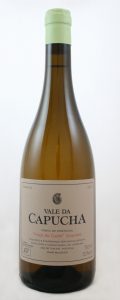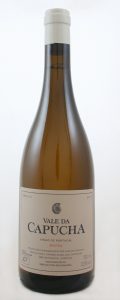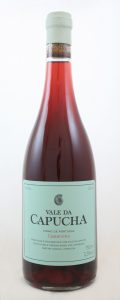
Pedro Marques’ Vale da Capucha wines are from organically farmed vines situated in the Lisbon region around eight km from the Atlantic Ocean on limestone soils rich with fossils. The precept is simple: maximum human work in the vineyard and minimum intervention in the winery. The resulting terroir-driven wines come from a medley of Portuguese varieties: Arinto; Fernão Pires; Alvarinho: Antão Vaz; Gouveio; Viosinho; Castelao; Touriga Nacional and Tinta Roriz.
The key to all the wines is this special terroir, the grapes being conduits to show off that terroir. When you taste the wines, you are tasting the freshness and saltiness which comes from the high limestone content of the family vineyard’s fossil-strewn calcareous slopes. Pedro, by the way, went fully organic in 2012, something he believed was essential for this transmission of unadulterated flavour. Hand-harvested and selected grapes and consistently low yields also helps in this endeavour.
When you taste the wines, you are tasting the freshness and saltiness which comes from the high limestone content of the family vineyard’s fossil-strewn calcareous slopes.
After setting up the vineyard organically the next step was to make his wines naturally with no added yeasts or enzymes. And not only that, to exalt the lees that derive from the native ferments. The juice for Vale da Capucha’s hand-picked grapes is settled and fermented naturally (with wild yeasts) on the lees at relatively warm temperatures (around 18 degrees centigrade) as Pedro values texture and body over aromatics. The use of barrels in the fermentation and the maturation process has increased the complexity of the wine, made them relaxed and less reductive. Not filtering either adds to the mouthfeel.
Moreover, he can afford to build body and texture because he has the opposite problem from most in Portugal – the high acidity which keeps Vale da Capucha wines so animated.
Gouveio is the same variety as the Godello of Galicia, a wine that tends to show comparatively little in the way of aromatics and is more about mid-palate texture. The grapes are hand harvested (all the Capucha wines are from low yields and selective manually selected fruit) with whole bunch pressing followed by fermentation in barrels for six months and being matured in the same oak vessels for a further 14 months. There is a natural malolactic and the wine goes to bottle without filtration or fining.
Arinto, which may justifiably lay claim to be a noble white Portuguese grape, hails from the Vinho Verde. It is renowned for its tears-of-limestone high natural acidity and presents a brilliantly linear chalky, mineral, citrus-crackling wine. The finish is searing, but the time spent in barrel has bequeathed it with an extra dimension.
Castelinho is our newbie from the estate, and our first Capucha red. It is made from Castelão, a hardy native grape that normally flourishes in the sandy soils of Setubal, as well as in the Douro where it is found in port blends. Also known as Periquita (parakeet). Whilst mostly robust and colourful, it is a slow ripening variety reaching phenolic maturation at low alcohol and on the calcareous soils around Lisbon, it can produce delicious refreshing wines for early drinking. This is a lovely wine made from whole bunch fermentation in small concrete tanks with native yeasts. The wine is unfiltered and bottled with minimal sulphites. Limber, lithe and stony-fresh with some sour cherry bite.

2017 Vale da Capucha Gouveio

2017 Vale da Capucha Arinto

2017 Vale da Capucha Castelao
*
Interested in finding more about Vale da Capucha wines? Contact us directly:
shop@lescaves.co.uk | sales@lescaves.co.uk | 01483 538820

